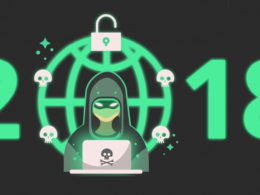Today's digital security problems are causing increasingly drastic consequences for companies. Since the first data leak controversies, as happened with the Facebook data leak scandal in 2018 and resulted in the payment of a fine of R$6.6 million, many companies have been looking for intelligent and efficient solutions that help maintain their your data more protected.
Our routine is increasingly related to the internet. With the advancement of digital transformation, it became necessary to look for tools and alternatives that could help increase the security of devices, networks and information . It was in this context that the LGPD – General Data Protection Law was created and implemented, bringing the essential parameters for companies to guarantee greater security for their information and resources.
With this in mind, we have listed essential tips that can help you stay even safer and contribute to digital security in your company.
What is digital security?
In a simplified way, digital security consists of a set of practices, processes and measures aimed at protecting devices, servers and networks , in order to mitigate and control possible threats.
Many people confuse this concept with information security, which is a very common mistake. However, information security is a methodology focused on protecting data and information , while digital security is a little more comprehensive, protecting operations and activities that are carried out in the digital environment.
In this way, we can understand that there is no information security without digital security, since, if your devices and networks are compromised, your data and stored information will also be compromised. Understand these differences better with this explanatory video:
There is no point in relying on solutions aimed at protecting data, such as private clouds and encryption, if your network is not prepared to protect itself from threats.
Virtual attacks can cause immense damage to the business, and for this reason establishing a digital security protocol in your company is much more than an alternative: it has become essential. Today's cyber attacks have a strong focus on leaking, destroying and controlling confidential information , which can considerably harm the continuity of your activities.
IBM provides an annual digital security report that reports the cost of data breaches for companies and businesses across all sectors. the 2022 survey is conducted by Ponemon Institute and IBM Security, and reported that, in March 2022 alone, 550 organizations in the world suffer cyber attacks, with an average cost of R$6.45 million for each data breach attack , showing an increase of almost 10% compared to recent years.
This report also presented very important information, for example:
- The average time to identify and contain a data breach case is 347 days ;
- One of the main violations are those applied through vulnerabilities in third-party software ;
- Only 25% of national businesses have fully implemented security automation
Main security issues today
Every day, cybercriminals find more cunning and efficient ways to corrupt systems and steal information. Due to this constant evolution, it is important to stay up to date with the main cyber risks that could harm your company's digital security. See below the main current threats:
Data leak
Data leakage consists of improper access to confidential and confidential data belonging to a person or company . This data can be collected, disclosed or passed on to other companies or cybercriminals.
This type of attack has gained great visibility, mainly due to the risks it presents to its victims. Individuals can have confidential information leaked and be subject to various types of financial scams, and companies can have their business image damaged due to information leaks.
The most commonly leaked data are access credentials (such as passwords and usernames) , financial data, bank account and credit card numbers, personal documents, contacts, among others.
The year 2023 has already started with a major data leak from the Deezer platform . Deezer is one of the main music streaming tools used in the world and suffered a substantial data leak two days ago. More than 220 million users were harmed, including 37 million Brazilians.
Cybercriminals disclosed email information, IP address and date of birth of platform users. Although the Deezer team reported that no sensitive data was leaked, they also recommended changing access data to ensure the security of your information.
DDoS attack
The DDoS attack , also known as a distributed denial of service attack, is a threat that is gaining more and more visibility. Its main objective is, taking advantage of the server's vulnerability, to make a page or network unavailable through overload .
To do this, it sends requests from different sources simultaneously, making the network unable to support the accesses. No matter how good your infrastructure is, servers can handle a certain amount of requests, so when this amount is exacerbated, responses become slower than usual or are even completely ignored.
Ransomware
Ransomware attacks are one of those that generate the most financial losses for companies. This is because, more than just collecting undue data, cybercriminals demand the payment of a ransom to regain access to information that has been blocked or encrypted.
This ransom is usually charged in cryptocurrencies, causing immense financial loss to its victims and making it much more difficult to track.
At the beginning of 2023, CPTM suffered a Ransomware attack , where cybercriminals demanded the amount of US$500,000 as a ransom payment.
Malware and viruses
Malware is a cyber threat that consists of a set of tools and resources that aim to infect devices, causing them to perform unsolicited functions.
Malware can infect all machines in a company without users realizing the threat, and can come through different routes, such as:
- Through corrupted files received via phishing email ;
- Internet pages that are not secure;
- Malicious links in false advertising;
- And much more.
As it consists of a set of malicious programs, malware also includes viruses , which infect machines and spread , damaging functions, performing unsolicited tasks or corrupting files and documents.
Essential Digital Security Tips
Most of the activities we routinely carry out are done over the internet , which is why it is necessary to have the help of resources that help keep this environment safer.
Although it brings numerous advantages, the internet can also be the gateway to various financial scams that have a major impact on individuals and companies.
For this reason, we have put together some digital security tips that can help you ensure even more security in this digital environment and help you protect your data and information.
1. Use reliable connections
With the growth of Home Office, many people are using residential and public networks to carry out their activities. However, not every Wi-Fi network is secure and can pose a major threat to companies, especially free connections.
For this reason, it is very important to be extra careful with the network connections used. These networks can corrupt data, collect information without the user noticing and create points of vulnerability that favor the application of various other scams.
For companies that need a more secure connection for remote workers, an efficient solution is a VPN. Virtual Private Network is a type of connection that allows employees to remotely access the organization's systems in a secure manner. This is because only devices that have the necessary security credentials can access these networks.
2. Strengthen your passwords
Although this is already considered a “basic” tip, it is always important to highlight the importance of using secure passwords in all your accesses and applications.
It is essential that the passwords used are difficult to deduce, avoiding dates of birth, pet names, repetitive characters... All of this makes the job of cybercriminals who want to improperly access your data easier. Always use upper and lower case letters, special characters and numbers, which help increase the security of your password.
The Passwords and biometrics in Brazil report of November 2022, carried out by Mobile Time/Opinion Box , demonstrated that more than 18% of Brazilians have already reported some security problem in tools and services related to the passwords used. This report also provided a list of the most used (and, of course, least secure) passwords, which includes:
- 123456
- Brazil
- 123456789
- 12345
- 12345678
- 102030
Check out the complete list of common passwords in this Olhar Digital article .
In addition, two-factor authentication can also be used, in other words: you can add a layer of security that will make unauthorized access even more difficult.
3. Keep software and applications up to date
The device, system, and software updates that appear to you are not random. The main objective of these processes is to make these tools even more secure, always in accordance with the most efficient resources available for digital security.
Just like technology, cyber threats also evolve every day, and the updates available help keep your network and devices even safer.
4. Control internet access
The IT sector can efficiently control user access access permissions to the company's devices, systems, applications, networks and services.
This control helps to bring more efficiency, security and practicality so that there is no interruption of activities or an excess of vulnerabilities created through the high number of accesses.
People who are not related to a specific activity do not need access to certain documents, therefore, access control can be done to reduce the chances of failures and information leaks.
5. Use firewall and antivirus
These security tools are essential for companies looking to improve their digital security and bring more protection to their data.
Depending on your company's profile, it is important to choose the tool that best suits your needs and that has the essential resources for your processes. These features will help block the main threats and bring even more digital security to your business.
6. Have a policy of conscious internet use
There are several pages and websites on the internet that were created specifically to apply scams. For this reason, the use of the internet within the company must be done consciously and safely, contributing to the business's digital security strategy.
To do this, it is possible to use a conscious internet use policy . Through this policy, companies are able to make their employees aware of the importance of safe behavior in the online environment and the consequences that a lack of attention to current threats can bring to the business.
7. Completely manage your internet with Lumiun Box
Lumiun Lumiun Box is a complete solution for internet control and security for companies. See some features that make Lumiun Box a truly essential solution:
- Website blocking – Block potentially harmful websites and applications and identify devices connected to the company's network, separating them by groups and assigning different rules to groups or users;
- Corporate Firewall – Protect entry points from the most common cyber attacks;
- Business VPN – Keep remote connections controlled and secure by managing users and access permissions;
- Unified control panel – Manage all users, connections and company branches in a single panel;
- Simple and fast – Generate reports, make changes and see everything in real time in a simple and intuitive control panel;
- Installation in 15 minutes – Without the need for technical knowledge and with full support, the Lumiun Box can be installed in just 15 minutes;
In addition to these, there are several other features and benefits of using Lumiun Box on your company's network, you pay exactly for what you use. Lumiun Box pricing is done according to the number of devices connected to the company's network .
Get a quote or request a free trial and make your company's network more secure and employees more productive on the internet.
Until later!











